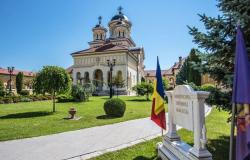Botoșani County, one of the poorest in Romania, has, paradoxically, extraordinary natural resources. All these resources, however, lie unexploited, including quartz sands of the best quality, and substantial reserves of gypsum and sulphurous waters.
The farm from Hudești in the good old days PHOTO Gheorghe Apătăchioaie
Botoșani County is considered one of the poorest in Romania, especially because of the poor rural areas but also because of the apparent lack of perspective. In reality, paradoxically, Botoșani is a poor rich county of Moldova. More precisely, it has particularly precious natural reserves that could bring it prosperity. However, only a small part of these natural treasures of Botoşani, little known to the general public, are exploited. Most lie buried under tons of soil, in areas marked by poverty and subsistence agriculture.
“They are the best quartz sands in Europe”
One of the most important natural reserves of Botoșani are the quartz sands of Hudești commune, located somewhere near the banks of the Prut river, in the extreme north of Romania. It is those sands that fueled the famous glass and porcelain industry in Dorohoi municipality. According to analyzes from the communist period, but also after those from 1992, carried out by a French team, the quartz sand from Hudești is the best in Europe.

What’s left of the exploitation from Hudești PHOTO Cosmin Zamfirache
“Their exploitation began during the communist period. They are a real treasure, they were used to make the best objects in the glass industry. And the French who came in ’92 said they were extraordinary”says professor Gheorghe Apătăchioei from Hudești.
Mayor Viorel Atomei from Hudești, mayor of the commune since 1990, says that these sands have extraordinary purity. “They contain 97% quartz. They contain a very small amount of iron trioxide, which makes them really special and valuable”, adds Viorel Atomei. In the 90s, the glass industry from Dorohoi disappeared, and the quartz sands from Hudești were no longer exploited.
Gypsum from Păltiniș, a still virgin resource
At a distance of approximately 20 kilometers from Hudești, in the commune of Păltiniș, an area even further north, also on the banks of the Prut, there is another important natural resource. It is about gypsum, a material used both in construction and in the medical industry. There are important deposits in Păltiniș, but which have never been exploited.
“It is one of the purest deposits in Europe, with a purity of 98.7%”, states Costel Romanescu, the mayor of Păltiniş.
Culmea, on the same deposit, on the other side of the Prut, in Ukraine and the Republic of Moldova, gypsum is exploited. In Romania, only during the communist period were plans made to found a factory in Darabani.
One of the most fertile soils
Also in Botoșani are the Mileanca chernozems, among the most fertile soils in Romania. It is also one of the exploited resources of Botoşani.
They are found in the Mileanca-Codreni area, Botoșani county, and it is a very fertile, but demanding land. Elderly people say that record productions were made from these soils, especially wheat.
Mileanca also had red wheat, a luxury resource for the pastry industry in the West at the beginning of the 20th century. A sample can be found in the halls of the Agronomy Institute “Ion Ionescu de la Brad” in Iasi.
The only flint mine in Romania was also located in the North Moldavian county, in the town of Miorcani, on the northern border of Romania with the Republic of Moldova, also on the banks of the Prut. Flint was used in the glass industry. The last gallery was definitively closed in 2007.
Added to these are the sulphurous waters, with officially confirmed medicinal properties, at Hlipiceni. In turn, these sulphurous waters are unexploited.
Tags: Poor rich county unexploited natural resources north Moldova starve region
-





